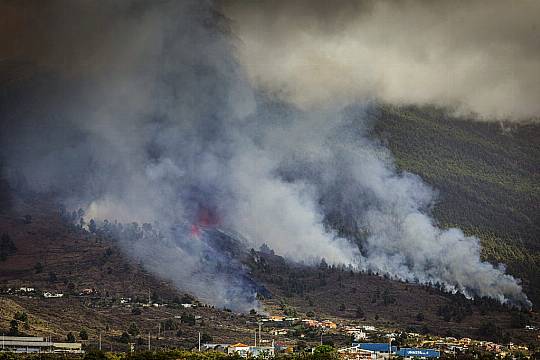A volcano on Spain’s Atlantic Ocean island of La Palma has erupted after a week-long build-up of seismic activity, prompting authorities to evacuate thousands as lava flows destroyed isolated houses and threatened to reach the coast.
The Canary Islands Volcanology Institute reported the initial eruption near the southern end of the island, which saw its last eruption in 1971.
Huge red plumes topped with black-and-white smoke shot out along the Cumbre Vieja volcanic ridge, which scientists had been closely watching following the accumulation of molten lava below the surface and days of small earthquakes.
Authorities immediately evacuated more than 1,000 people, but Spain’s Civil Guard said it may need to evacuate up to 10,000 residents.

La Palma, with a population of 85,000, is one of eight volcanic islands in Spain’s Canary Islands archipelago off Africa’s western coast.
A 4.2-magnitude quake was recorded before the volcanic eruption, which took place in an area known as Cabeza de Vaca on the western slope as the ridge descends to the coast.
As the eruptions continued, at least two open mouths belched bright red magma into the air that then flowed in tight streams down the mountain slope.
Shortly after the initial explosion rocked the area, one black lava flow with a burning tip immediately slid toward houses in the village of El Paso.
Mayor Sergio Rodríguez said 300 people in immediate danger were evacuated, roads were closed and authorities urged the curious not to approach the area.
The lava eventually reached some homes, causing at least one chalet with a tower to crumble. Authorities warned that the lava flows could also threaten the municipalities of El Paraiso, Alcala and surrounding areas.
Itahiza Dominguez, head of seismology of Spain’s National Geology Institute, told Canary Islands Television that although it was too early to tell how long this eruption would last, prior “eruptions on the Canary Islands lasted weeks or even months”.
The last eruption on La Palma 50 years ago lasted just over three weeks. The last eruption on all the Canary Islands occurred underwater off the coast of El Hierro island in 2011. It lasted five months.
Volcanologist Vicente Soler, of Spain’s Higher Council, said “the material appears to be very fluid, the lava flows will reach the sea sooner or later”.
The scientific committee of the Volcano Risk Prevention Plan said part of the island’s south-west coast was at risk from landslides and rock falls.
Spanish Prime Minister Pedro Sanchez cancelled his trip to New York to attend the UN General Assembly so he could travel from the mainland to the Canary Islands.







